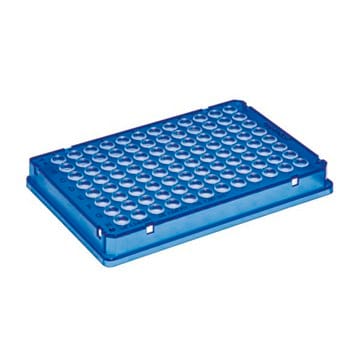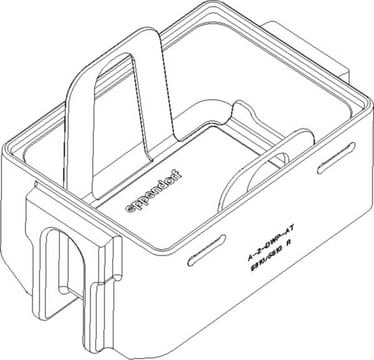EP951040601
Eppendorf® Protein LoBind Microplate 384/V-PP
PCR clean, V-bottom clear wells, white border, pack of 240 ea (10 bags × 24 plates)
Se connecterpour consulter vos tarifs contractuels et ceux de votre entreprise/organisme
About This Item
Code UNSPSC :
41106300
Produits recommandés
Matériaux
V-bottom clear wells
polypropylene
Stérilité
non-sterile
Caractéristiques
PCR clean
lid: no
skirt
Conditionnement
pack of 240 ea (10 bags × 24 plates)
Fabricant/nom de marque
Eppendorf® 951040601
Volume des puits
140 μL
Couleur
clear wells
white border
Adéquation
suitable for (protein analysis)
suitable for PCR
Description générale
Microplate 384/V-PP, Protein LoBind, wells clear, 140 µL, PCR clean, white, 240 plates (10 bags × 24 plates)
- Eppendorf LoBind material ensures excellent sample recovery for improved assay results
- Free of surface coating (e.g., silicone) to minimize the risk of sample interference
- Lot-certified PCR clean purity grade: free of human DNA, DNase, RNase and PCR inhibitors
- Available in tube, microplate, and deepwell plate formats for easy-up scaling
- Unique OptiTrack® matrix: 30 % faster sample identification and fewer pipetting errors
- RecoverMax® well design: optimized well geometry for minimal remaining/dead volume and excellent mixing properties
- Raised well rims and a smooth surface ensure reliable sealing in plates
Caractéristiques et avantages
- Eppendorf LoBind material ensures excellent sample recovery for improved assay results
- Free of surface coating (e.g., silicone) to minimize the risk of sample interference
- Lot-certified PCR clean purity grade: free of human DNA, DNase, RNase and PCR inhibitors
- Available in tube, microplate, and deepwell plate formats for easy-up scaling
- Unique OptiTrack® matrix: 30 % faster sample identification and fewer pipetting errors
- RecoverMax® well design: optimized well geometry for minimal remaining/dead volume and excellent mixing properties
- Raised well rims and a smooth surface ensure reliable sealing in plates
Informations légales
Eppendorf is a registered trademark of Eppendorf AG
OptiTrack is a registered trademark of Eppendorf AG
RecoverMax is a registered trademark of Eppendorf AG
Certificats d'analyse (COA)
Recherchez un Certificats d'analyse (COA) en saisissant le numéro de lot du produit. Les numéros de lot figurent sur l'étiquette du produit après les mots "Lot" ou "Batch".
Déjà en possession de ce produit ?
Retrouvez la documentation relative aux produits que vous avez récemment achetés dans la Bibliothèque de documents.
Nikos Tsolakos et al.
Vaccine, 28(18), 3211-3218 (2010-03-02)
In this study, we evaluated the effect of the growth medium on the composition and immunogenicity of meningococcal outer membrane vesicle (OMV) vaccines after cultivation of the Norwegian serogroup B 44/76 vaccine strain in either Frantz' or modified Catlin-6 media
Sharon N Finger et al.
Nucleic acids research, 36(4), 1260-1272 (2008-01-05)
Telomerase is a ribonucleoprotein enzyme that maintains chromosome ends through de novo addition of telomeric DNA. The ability of telomerase to interact with its DNA substrate at sites outside its catalytic centre ('anchor sites') is important for its unique ability
Thandavarayan Kathiresan et al.
Methods in molecular biology (Clifton, N.J.), 493, 269-286 (2008-10-08)
Functional proteomics comprises a wide range of technologies for the identification of novel protein-protein interactions and biological markers. Studies of protein-protein interactions have gained from the development of techniques and technologies such as immunoprecipitation, preparative two-dimensional (2-D) gel electrophoresis for
Hartmut Stocker et al.
Antimicrobial agents and chemotherapy, 50(2), 667-673 (2006-01-27)
Therapeutic drug monitoring (TDM) is gaining importance for improving the success of antiretroviral treatment in human immunodeficiency virus-infected patients. However, enfuvirtide (ENF) concentrations are not regularly determined. The objective of this work was to study the pharmacokinetics (PK) of ENF
E I Trilisky et al.
Journal of chromatography. A, 1142(1), 2-12 (2007-01-24)
Purified viruses are used in gene therapy and vaccine production. Ion-exchange chromatography (IEC) is the most common method for large-scale downstream purification of viruses and proteins. Published IEC protocols provide details for specific separations but not general methods for selecting
Notre équipe de scientifiques dispose d'une expérience dans tous les secteurs de la recherche, notamment en sciences de la vie, science des matériaux, synthèse chimique, chromatographie, analyse et dans de nombreux autres domaines..
Contacter notre Service technique







